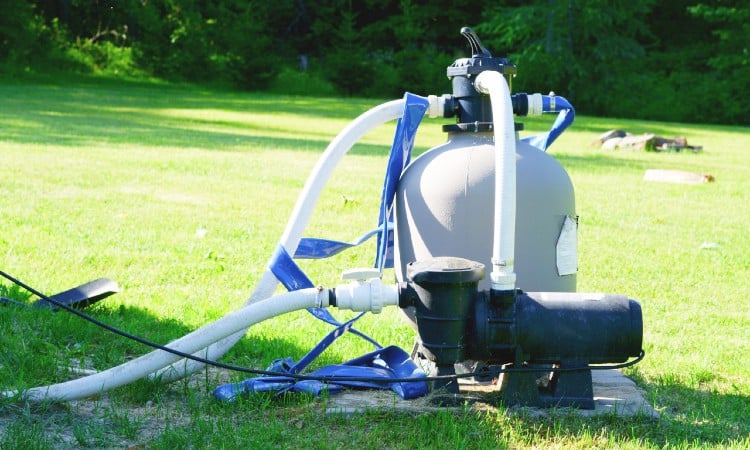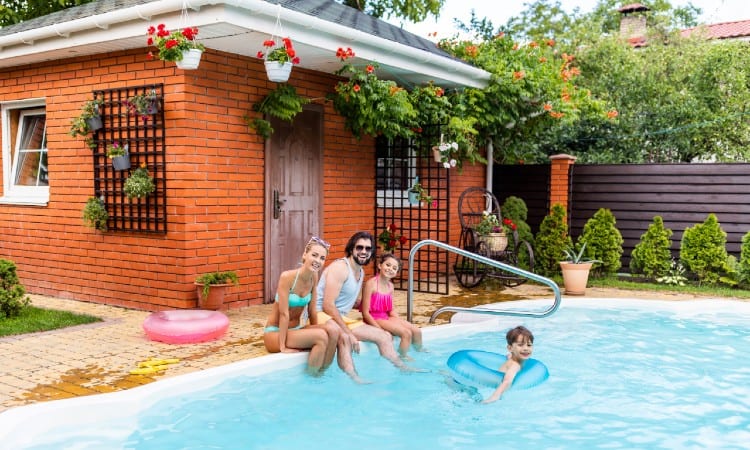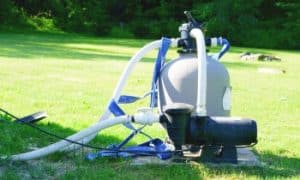Did you know that your pool pump should be running for eight hours each day to effectively clean and circulate all the water in your pool? You may be lucky enough to be gone at work for those hours during the week, but what about weekends or your neighbors? If you’re wondering how to quiet a noisy pool pump, then you’re not alone.
I used to be surprised each summer at just how loud my pool pump was. And not just mine, my neighbors as well. I remember grilling out on the deck and hearing grinding and gurgling away, disturbing the serene peace of my backyard. Then I heard my neighbor’s pump cycle on as well, and I realized that it’s an issue that all pool owners are dealing with.
In this article, we’re going to discuss some practical solutions for quieting that noisy pool pump. Afterward, I’ll even suggest some of the quietest pool pumps on the market in case you want to replace yours with a quieter model. But before all that, let’s figure out why pool pumps are so noisy in the first place.

Why is my Pool Pump so Noisy?
There are several reasons why your pool pump is making so much noise. No matter what, they have to run a motor and circulate the water in your pool. It’s never going to be dead-silent, but it shouldn’t make an excessive racket either. The following four culprits seem to be responsible for most of the maddening ruckus that your pool pump is making.
Excessive Vibration
Pool pumps are run by a motor. Motors cause vibration, so if your pump isn’t securely and evenly mounted, then the vibrations can be amplified.
Ideally, your pump should be mounted to concrete. If it’s mounted to a wood surface such as a deck, then the wood can resonate, magnifying the sound and making it even louder. If this is the case in your situation, try to see if it’s possible to move it to a more solid mounting location on concrete.
While your pool pump is running, see if applying hand pressure to the pump changes the sound it’s making. If so, then the vibrations may be caused by loose mounting bolts that you can easily tighten. Be careful touching your pool pump while it runs; it could likely be hot.
Pool Pump Cavitation
If your pool pump is getting enough water for any reason, then cavitation can start to occur around the impeller. Bubbles form at the eye of the impeller, changing fluid conditions as they carry over to the discharge side of the pump and implode against the impeller face.
Over time, this can cause many other problems aside from being a noisy nuisance. For instance, if running without sufficient water, the pool pump can easily overheat and ruin the motor. You may also have to deal with the shaft seal failing, or the impeller separating from the shaft entirely. If this happens, it will be rattling around inside the pump and your noise problems will have gotten much worse, almost immediately.
Cavitation can be caused by blockages anywhere in the line that is preventing water from getting to the pump. It can also be caused by pool water levels that are too low.
Clogged or Blocked Pump
Pools catch a lot of debris like leaves, twigs, insects, and plenty more. Baskets and cleaners attempt to remove them before they make it to your pool pump, but sometimes it still happens.
Debris can easily clog the pump impeller, forcing it to work harder and becoming noisier. When the impeller is clogged, it can cause a loud grinding noise and stop the pump from working altogether. A blockage anywhere in the system can prevent the pump from getting enough water and cause cavitation.
Worn Out Bearings in the Motor
Two main bearings inside of your pool pump’s motor are responsible for keeping the rotor turning smoothly. As the lubricants start to degrade over time, the motor can become very noisy, making screeching and grinding sounds that you won’t miss.
If two little bearings sound like cheap parts to replace, you’d be half right. The parts are pretty cheap, but it’s a labor-intensive job that could cost quite a bit to have done unless you can dig into the pump motor yourself and replace them.

Solutions for a Noisy Pool Pump
Now that we’ve discussed the reasons why your pool pump is so loud to begin with, let’s figure out how we can mitigate the issue. There are several different ways to quiet your pool pump.
Depending on why your pump is making so much noise, some of these will be more or less effective for your particular situation. If all else fails, the final suggestion is to replace the pump with a quieter one, which will undoubtedly cure any of the pool pump problems you’re currently experiencing.
1. Raise the Water Level in Your Pool
Pool pump cavitation is rather common, and if it’s happening because water levels in the pool are too low, then it’s an easy fix.
The water in your pool should reach the openings on the skimming baskets. That way, you know that water is making it into the pump system and supplying the pump. If your water isn’t high enough right now, you can easily add more with your hose.
2. Clean Out the Skimmer Baskets
The skimmer baskets around your pool are meant to collect debris and prevent it from getting into the pool pump or staying in your pool. But if that debris causes one or more of the baskets to get clogged, then water won’t reach your pump and it could cause problems like cavitation.
Go around your pool and empty each of the skimmer baskets, throwing away any debris that’s accumulated. This will allow water flow to be restored and your pool pump should begin working again. Remember to perform this skimmer basket cleanout regularly to avoid clogging issues in the future.
3. Empty the Pump Basket
We’ve already discussed emptying the skimmer baskets that reside around your pool, but your pool pump also has a collection basked of its own to ensure that no debris is getting directly into the pump. If the basket gets too clogged, debris may make its way into your pump, clogging up the impeller and possibly causing irreversible damage.
Cleaning out your pool pump filter basket is just as important as emptying the skimmer baskets. They should be done together at regular intervals. If you live in an area where the pool collects debris very quickly, then you may need to clean out these baskets every few days to prevent buildup.
The more vigilant you are about keeping the pool pump system clean, the longer it will last and the quieter it will run.
4. Level the Pool Pump and Filter
If your pool pump is installed unevenly, then it’s likely vibrating much more than it should be, which can cause excessive amounts of noise. To fix this, you’ll need to unbolt it where it’s currently positioned and re-install it level.
You may be able to manage this on your own if you have a bit of DIY experience and a few tools available. If not, then it’s also alright to call in the professional help and let them re-install it correctly. They can also inform you of any other issues that you may be experiencing from your pool pump.
5. Install Vibration Pads
You can’t entirely stop the motor on your pool pump from running and making noise. But if the vibration it’s causing is making it too loud, you can mitigate the issue by installing an anti-vibration pad beneath your pump motor to dampen a lot of the noise.
These pads are made of thick rubber that will stop the vibrations from transferring into your deck or pool base and resonating, becoming even louder. One that I had great luck with that offers 95% noise reduction.
Installing your anti-vibration pad is easy. Unbolt the pool pump motor so that it can be lifted from the surface it’s attached to. Once you lift it, simply slide the anti-vibration pad into place beneath the motor and set the motor on top. Re-install the bolts all the way around and your pool pump will now make far less vibration noise.
6. Tighten the Mounting Screws/Bolts
Just because your pool pump is causing vibration noise doesn’t mean you necessarily need to replace it or even add an anti-vibration pad beneath it. Often, over time, the bolts that were used to install the pool pump motor can loosen up from the constant vibration of running for eight hours each day. Luckily, this is a very simple fix that will cost you nothing to perform and you can do it yourself.
Locate the bolts that are holding your pool pump motor in place. They may have a Phillips or straight head that can be tightened with a screwdriver, or they may have a bolt head that requires a socket. Using the appropriate tool, tighten the mounting bolts or screws as tight as you can. Hopefully, this will secure the pump motor and prevent future vibration issues.
The bolts can loosen up again after a few more months or years of use, so if your pump starts making noise once more, you may want to check that these bolts are still tight.
7. Clean the Impeller on Your Pool Pump
We’ve covered a lot of the easiest solutions so far, so now the fixes I’m going to present may take a bit more work on your part. Inside of your pool pump is an impeller that spins to force the water through the system. If debris makes it into the pump and clogs up the impeller, it can cause loud noises, and worse, it can even cause a system failure.
The first thing to check is the pump basket. Make sure that it’s clear of all debris and don’t allow it to get backed up.
Once the pump basket is empty, you can use it to test the pump and see if it’s clogged. Using a hose, fill up the pump strainer basket and see how long it takes to empty while the pump is running. If it is slow to empty, then the pump impeller is clogged.
To get to the impeller for cleaning, you’ll have to remove the motor cover. Once you do, you should be able to see just how much debris made its way into the pump. While you’re in there removing the debris, check the impeller for damage. If it’s damaged, then it may need to be replaced if you want a well-functioning and quiet pool pump system.
8. Replace Worn Out Bearings/Rebuild Pump Motor
Your pool pump has two crucial bearings inside that allow the rotor to turn. With time and tons of use, they can start to lose their lubrication, causing them to wear out.
The bearings aren’t very expensive, and you can purchase them as part of a rebuild kit that also includes a new shaft seal, another part that commonly goes bad around the same time as the bearings.
Although the parts themselves are pretty cheap, it’s a difficult job to replace them and it will take some time and effort. Worse, you’ll likely need specialized tools to complete the job. The bearings won’t just come out with your fingers; you may need special bearing pullers to get them out.
So even though the parts are affordable, if you have to pay a professional to change them out, then it’s going to get a bit pricey. But it’s still much cheaper than replacing the entire pump!
9. Use Cartridge Filter
Traditional sand-filled pool filters pass the water through a port before it reaches the filter. This causes extra noise and is part of why these pool pumps seem so loud. But there is a solution to this problem.
Cartridge filters are much quieter than sand-filled pool filters. They don’t require a port, and they’re a small contained unit that makes less noise by design. The filter is also much easier to change than going through all the trouble of replacing the sand in your old-style filter.
One cartridge-style pool pump filter I like is the . This pump is double insulated for quiet operation and will make an instantly noticeable difference in the amount of noise your pool pump system makes.
10. Install Pool Pump Cover
One very simple solution for your noisy pool pump is to place a cover over it, like . This is one of the easiest solutions since all you have to do is place it on top of your pump and bolt it down.
This cover will dampen the sound your pool pump is currently making, absorbing some of that noise and preventing it from spreading out to you and your neighbors. But it also serves double duty by offering protection from the elements.
These covers work with most centrifugal and jet pumps, so you should have no problem making it work with your pump. They also offer sufficient ventilation and will allow your pool pump to run at full capacity while keeping a lot of the noise in.
11. Build a Soundproof Enclosure for Your Pool Pump
If a slip-on pool pump cover doesn’t offer enough noise reduction for you, then you may consider building your soundproof enclosure to cover your pool pump. Like a pump cover you could purchase, this will also protect your pool pump from the elements and should increase its lifespan overall.
Your pool pump enclosure can be a simple box built from thick plywood. Inside, you’ll want to coat the walls with Green Glue to enhance the sound absorption qualities of the enclosure.
After applying green glue inside, you can add a layer of soundproofing foam as well. This will absorb a lot of the noise and contain it to the enclosure so it won’t escape.
Don’t forget to add plenty of ventilation for your pump. Figure out where it’s getting airflow from and create a vent in your enclosure in that same area. You can even use some duct to ensure that you’re getting great airflow without compromising the sound reduction qualities of your box.
Because a pool pump can have some of the same issues as a generator, you may get more ideas from our article How to Make a Generator Quiet.
12. Replace Pool Pump With Quieter Model
Sometimes the best solution is to just start fresh with a brand new pool pump. If your pump is an older model, then it may never have been very quiet to begin with. As technology improves, our pool pumps have gotten much quieter, and some models today are nearly silent.
Keep in mind, this is one of the more expensive solutions to your pool pump noise issues. But if you replace your pump with a quieter, newer model, you should have no noise problems left. You could save some money by installing the new pump yourself if you have the skills.
When looking for a new pump that’s going to be quieter than your old pump, look for a variable speed pump. Traditionally, pumps are either on or they’re off. But a variable speed pump will run at lower speeds, automatically changing speeds when necessary. This makes them much quieter than single-speed pumps since they don’t always run at max speed and volume. They also use less electricity to run at lower speeds, saving you money in the long run on energy costs.
13. Place the Filter System far from the pool
If your pool is already in place and setup, then this may be a difficult solution to implement. But if you’re building a new pool, try to place the filter system at least 20 feet from the pool.
Likewise, try to position it away from your home and the neighbors as well. The farther the pump is, the less you’ll hear it. If it’s close to the pool and the house, then it will seem a lot louder.
14. Build a Shed for Pool Pump and Filter
If you can keep your pool filter system separated from the pool and the house, you’ll do a lot to reduce how loud it seems. But you can take that even further by building a shed for the pump and filter to contain the noise.
Once again, this may be a difficult way to solve the noise problem if your pool is already built. But if you’re building a new pool, then planning to place the filter and pump system away from the house and your neighbors and inside of a shed can mean that you’ll never have to deal with these noise problems in the first place.
When building your noise containment shed, make sure to use thick material like ¾” plywood to help keep the noise in. You can also use soundproofing products like Green Glue and acoustic foam panels inside of the shed to help make it even more soundproof.
For more complete details about your shed, please see our article How to Soundproof a Shed.
Quietest Pool Pumps for Replacement
If you still can’t seem to get your pump to be quiet enough for your liking, then it may be time to purchase a new pump that’s built to be extra-quiet. Some of the pumps on the market today are so quiet you’ll barely notice them running. These two are the ones I’d personally recommend, and they’re both very quiet pumps that should help you finally relax poolside in peace.
Hayward SP2303VSP MaxFlo VS
The Hayward MaxFlo pumps have long been a favorite for keeping pools clean and filtered everywhere. They’re very robust and known for living long lives free of problems. But the takes this even further by implementing variable speed technology.
With the inclusion of variable speed, the MaxFlo pump is now much more energy-efficient, saving you money each month on your energy bills. It will save you up to 80% over a traditional single-speed pump. But more importantly, it’s also much quieter now since the motor won’t always be running at full speed.
Available in 115V and 230V models, you should be able to set this pump up where your current pump is now using the same hookups.
Pentair 342001 SuperFlo
Pentair is a well-known name that’s been making high-quality pool pumps for many years. Now you can get their flagship SuperFlo pumps in a variable speed format, such as the .
This pump has three different speed settings, saving you money on energy costs and making far less noise that traditional single-speed pumps. This means you’ll get the great Pentair performance that you can trust, but without the excessive noise and high energy costs.
At low speed, this pump is so quiet you can barely hear it. Plus, it will save you up to 80% on your energy usage over other pumps without the variable speed technology.
Since it runs on 115V or 230V power, you’ll be able to hook it up to your existing electric, saving you money and time on installation.
Conclusion
If you’re tired of hearing your noisy pool pump disturbing the peace, you’re not alone. In this article, we’ve discussed the reasons why your pool pump is so noisy in the first place. I even provided 14 excellent solutions that you could do today to stop your pump from annoying your family and neighbors with its loud operation. If all else fails, you can always swap your current pool pump for one of the much quieter variable-speed pumps that I suggested in the final section.
No matter which method you choose, I hope you find the path to pool pump peace. If you still have any questions, feel free to leave them in the comment box below so that I can get back to you with a response. If you found this information helpful or useful, please be sure to share it so that others can use these tips to find some respite from their overly loud pool pumps as well.


Eugene, I found your article extremely helpful! Thank you for all of this information!
Hi Tim,
Thanks for the kind words.
Terry
Will these techniques work for a loud pool heater? Thanks
Pat